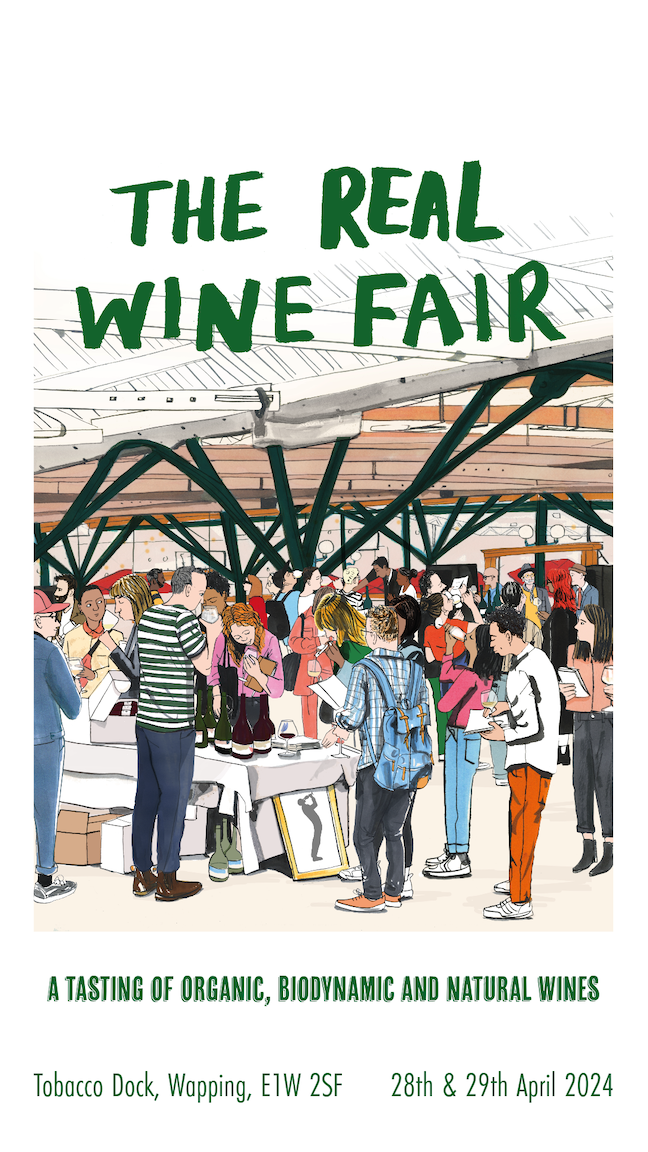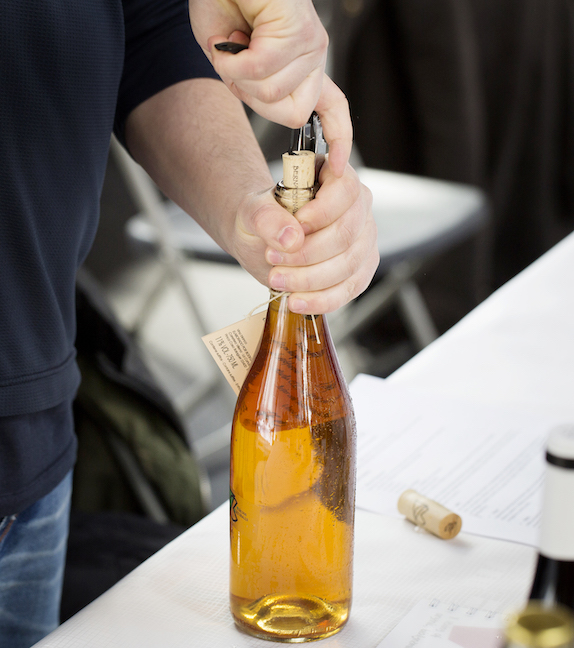Having stuck a thousand blogs (mille tonnerres) in my back pocket – I am never going to let you forget that stat – it’s time to poke the first verbal knitting needle into 2024 and see if we draw wine or whey. (Note to self – cut out the far-fetched fattening whimsical metaphors).
The main event for us in 2024 will be the Real Wine Fair. Over 170 producers have confirmed. It promises to be another terrific fair.
Once upon a time when I was a young revolutionary, I sketched out a rudimentary idea for a wine magazine. I had the name: Ferment. I had the idea. It was going to be wild, contrarian, irreverent, satirical, ranty. Needless to say, this particular ferment got stuck at an early stage. Nowadays, while I am happy to have the odd swift pop at those things that grind my gears in the wine world, I prefer to focus on more positive stories.
Really Real Again: The main event for us in 2024 will be the Real Wine Fair. The venue has imposed limits on numbers, so we recommend you register for tickets. Over 170 producers have confirmed. It promises to be another terrific fair.
Stockpot: Adroit timing is everything. At the end of the last year, when everyone was dreaming of mince pies and hangovers, we received tanker-loads of wine shipped from around the world: Georgia, US, Argentina, Spain, New Zealand and Italy. In no particular order. I know that January is not the buying month, but these beautiful wines are clamouring for new homes.
There’s More To Our List Than Wine: A recent presentation of ciders, perries and whatnot by James and Lawrence of Little Pomona left us scratching our heads. These drinks are so delicious and nourishing, giving you the flavour and textural profiles of wine. At a lower abv. At a lower profile. There are so many arguments for listing cider in the heart of wine lists and on pairing menus, but there is still a vacuum in terms of knowledge and confidence within the trade. Time to apple-ly ourselves to the task of enthusing about the many virtues of cider and perry.
Resolution foundations
I have given up on making resolutions in favour of having vague (very vague) unstated objectives. My wine resolutions never change, however. Drink better wine, drinking real, living wine. I won’t get into what this here. A more important aspiration is that we collectively do as much as we can to mitigate our impact on the environment and audit our lifestyles – at home and at work – accordingly. There are loads of ways of reducing our imprint in the wine world ranging from farming without chemicals, to using less energy, recycling as much as possible, and so forth. I would advocate strongly for fewer international wine fairs. I don’t know if anyone has audited one of these huge events in terms of their environmental impact, but they must, by definition, generate many thousands of plane and car journeys and be responsible for a massive energy output. Surely, there are efficient ways of transacting business? Ironically, we are putting on another edition of The Real Wine Fair this year (April 28th and 29th, folks), but at least the event is every other year, most of the growers don’t have that far to travel, we barely have to switch on the lights, and we are constantly looking at ways of reducing our environmental impact.
Doffing the capsule
What grinds your gears about wine? Wrong – the answer is wine capsules. Cutting through these superfluous closures with a blunt wine knife is as dispiriting as it is time consuming. Capsules were traditionally made of lead, but these were banned in the United States and the European Union in 1993. The idea in olden days was to protect the cork from mould or nibbling critters during the years a bottle was stored in a cobwebby cellar.
Having no capsule definitely cuts down on waste, and when we are talking about lightweight glass bottles and paper labels to help reduce wines’ environmental footprint, this seems a no-brainer.
Today’s cellars are cleaner, temperature and humidity controlled, and largely rodent-free (apart from certain mousy wines!), and, of course, we drink most of our wine soon after purchase. So who needs the capsule? They serve no protective purpose — they are mere decoration and branding. We toss them in the landfill, or they remain on the bottles as potential contaminants in the recycling centre. They’re a cost to the winemaker (and therefore the consumer) and to the planet. Smaller wineries need to rent special equipment to spin capsules onto bottles, as well as hire an extra worker to handle that machine. Having no capsule definitely cuts down on waste, and when we are talking about lightweight glass bottles (and other formats) and paper labels to help reduce wines’ environmental footprint, this seems a no-brainer.
Gobi or not gobi
Why dry January – a parched throat crossed with prim virtue signalling? In onomatopoeic terms, it sounds to me like a contemptuous smirk. Although it was the appearance of sober October that really got this mild-mannered writer kicking off big time. Absence may make the heart grow fonder, but Abstinence (capital A denoting deadly sin) always seems like the puritanical rejection of pleasure. Which is not to say that we should rely on the kiss and kick of booze to give our lives meaning, but rather that we should drink in moderation and only when we are in the mood to appreciate an alcoholic beverage. Imagine, as Dean Martin quipped, waking up in the morning and knowing that’s the best you are going to feel all day. To be fair, the endorphin rush of exercise gives one a high, but it is not a social activity and not something you do while having a civilised meal, unless your idea of civilised eating is on the hoof.
Drink up
Bang-for-buck, value for money. What are these things? The notion of value has been subverted by supermarkets offering wines at or below cost price to get people through their doors. In the real wine world, where wine is not just a commodity, value is in the eye and mouth of the beholder. Value rarely resides in the cheapest wines because these are usually the products of industrial farming and factory winemaking. When you strip out the associated costs of bringing fermented grape juice to the consumer – duty, tariffs, vat, glass, paper, cardboard, cork/closure, transport, storage, delivery, not to mention the cost of picking grapes, paying for labour, buying/leasing equipment, running a winery, marketing, not to mention the kickbacks given by brands to supermarkets for exposure plus free stock, further retrospective discounts, plus the cost of raising documents and other niggly bits of government bureaucracy, it’s astonishing that wine isn’t a lot more expensive that it is. And I haven’t even mentioned the livelihood of the vignerons! Selling wine on the cheap devalues all wine.
When you strip out the associated costs of bringing fermented grape juice to the consumer, it’s astonishing that wine isn’t a lot more expensive that it is…Selling wine on the cheap devalues all wine.
When a wine relatively overdelivers on flavour then that is value for money. It is not simply fulfilling its function to be a beverage called wine, it makes you appreciate it for its quality. Plus you might be able to afford to drink it everyday (notwithstanding dry January zealots). Although even expensive wines, if they give rise to glorious life-changing epiphanies, may be deemed to be great value.
Orange Attention Deficit Disorder
I love orange wines, or skin-contact wines, if you prefer. Then, why in 2023, did I drink so few of them? The answer to this rhetorical question is that I tend to choose what to drink according to particular cravings. Over the years, my palate seems to realign itself. That is probably due to the phenomenon known as “palate fatigue.” In 2020, over 1/3 of the wines I drank were orange. I was in a comfortable place. I wanted to wallow in the wine, caress the lavish liquid in my mouth. In 2023, conversely, I craved nervous impactful wines that would give me a good metaphorical slap on the face. Of course, I will return to orange wines when the need arises. My love for them has not diminished a jot.
*
Interested in purchasing wines from us, orange or otherwise? Contact us directly:
shop@lescaves.co.uk | sales@lescaves.co.uk |
01483 538820
And book your tickets for the Real Wine Fair 2024, on 28-29th April HERE!




Of course good value wine does not necessarily equate with cheap wine. In fact it rarely does. Yet it cannot escape the attention of the wine trade that times are hard. Real earnings, measured by the standard of living, have dropped, whilst inflation has risen and wine has risen in price even more than many other commodities, and for a host of reasons. I doubt I am alone in looking less often for wines of good value and more often now merely for wines I can afford. It’s a sad reality, and yes, at least I can continue to drink wine most nights, and have access to it. But the phrase sic transit gloria mundi does seem apt, at least in the case of my wine world.
Less but better is the catch phrase that comes to my mind upon reading your comment David. It is true that we all have less money to spend but if we presume that there are better times ahead, which wines would you rather have available to you then? The fact that you are reading this blog makes me think you would rather have some interesting bottles to choose from.
I would prefer to keep the good value, good quality wines made by passionate, conscientious winemakers and lose the cheaper, industrial bottles go that are made at a cost to the planet and the workers exposed to the chemicals used to make them.
So I find myself buying and drinking less wine but doing my best to maintain the quality and value of what I am drinking. I will admittedly go back more often to the bottles that I already know to offer that value and being less likely to try something new in the same price bracket. I encourage you to get more value and more enjoyment out of your wine by giving this a go. Whether that be drinking wine less often or having a glass or two less each evening to stretch your better bottles over to the next day. By buying fewer bottles of better wine, I hope for better wine overall in the future.